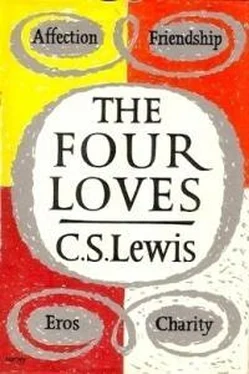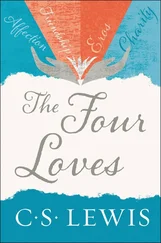But in addition to these natural loves God can bestow a far better gift; or rather, since our minds must divide and pigeon–hole, two gifts.
He communicates to men a share of His own Gift–love. This is different from the Gift–loves He has built into their nature. These never quite seek simply the good of the loved object for the object's own sake. They are biased in favour of those goods they can themselves bestow, or those which they would like best themselves, or those which fit in with a pre–conceived picture of the life they want the object to lead. But Divine Gift–love—Love Himself working in a man—is wholly disinterested and desires what is simply best for the beloved. Again, natural Gift–love is always directed to objects which the lover finds in some way intrinsically lovable—objects to which Affection or Eros or a shared point of view attracts him, or, failing that, to the grateful and the deserving, or perhaps to those whose helplessness is of a winning and appealing kind. But Divine Gift–love in the man enables him to love what is not naturally lovable; lepers, criminals, enemies, morons, the sulky, the superior and the sneering. Finally, by a high paradox, God enables men to have a Gift–love towards Himself. There is of course a sense in which no one can give to God anything which is not already His; and if it is already His, what have you given? But since it is only too obvious that we can withhold ourselves, our wills and hearts, from God, we can, in that sense, also give them. What is His by right and would not exist for a moment if it ceased to be His (as the song is the singer's), He has nevertheless made ours in such a way that we can freely offer it back to Him. "Our wills are ours to make them Thine." And as all Christians know there is another way of giving to God; every stranger whom we feed or clothe is Christ. And this apparently is Gift–love to God whether we know it or not. Love Himself can work in those who know nothing of Him. The "sheep" in the parable had no idea either of the God hidden in the prisoner whom they visited or of the God hidden in themselves when they made the visit. (I take the whole parable to be about the judgment of the heathen. For it begins by saying, in the Greek, that the Lord will summon all "the nations" before Him—presumably, the Gentiles, the Goyim ).
That such a Gift–love comes by Grace and should be called Charity, everyone will agree. But I have to add something which will not perhaps be so easily admitted. God, as it seems to me, bestows two other gifts; a supernatural Need–love of Himself and a supernatural Need–love of one another. By the first I do not mean the Appreciative love of Himself, the gift of adoration. What little I have to say on that higher—that highest—subject will come later. I mean a love which does not dream of disinterestedness, a bottomless indigence. Like a river making its own channel, like a magic wine which in being poured out should simultaneously create the glass that was to hold it, God turns our need of Him into Need–love of Him. What is stranger still is that he creates in us a more than natural receptivity of Charity from our fellow men. Need is so near greed and we are so greedy already that it seems a strange grace. But I cannot get it out of my head that this is what happens.
Let us consider first this supernatural Need–love of Himself, bestowed by Grace. Of course the Grace does not create the need. That is there already; "given" (as the mathematicians say) in the mere fact of our being creatures, and incalculably increased by our being fallen creatures. What the Grace gives is the full recognition, the sensible awareness, the complete acceptance—even, with certain reservations, the glad acceptance—of this Need. For, without Grace, our wishes and our necessities are in conflict.
All those expressions of unworthiness which Christian practice puts into the believer's mouth seem to the outer world like the degraded and insincere grovellings of a sycophant before a tyrant, or at best a façon de parler like the self–depreciation of a Chinese gentleman when he calls himself "this coarse and illiterate person". In reality, however, they express the continually renewed, because continually necessary, attempt to negate that misconception of ourselves and of our relation to God which nature, even while we pray, is always recommending to us. No sooner do we believe that God loves us than there is an impulse to believe that He does so, not because He is Love, but because we are intrinsically lovable. The Pagans obeyed this impulse unabashed; a good man was "dear to the gods" because he was good. We, being better taught, resort to subterfuge. Far be it from us to think that we have virtues for which God could love us. But then, how magnificently we have repented! As Bunyan says, describing his first and illusory conversion, "I thought there was no man in England that pleased God better than I." Beaten out of this, we next offer our own humility to God's admiration. Surely He'll like that ? Or if not that, our clear–sighted and humble recognition that we still lack humility. Thus, depth beneath depth and subtlety within subtlety, there remains some lingering idea of our own, our very own, attractiveness. It is easy to acknowledge, but almost impossible to realise for long, that we are mirrors whose brightness, if we are bright, is wholly derived from the sun that shines upon us. Surely we must have a little—however little—native luminosity? Surely we can't be quite creatures?
For this tangled absurdity of a Need, even a Need–love, which never fully acknowledges its own neediness, Grace substitutes a full, childlike and delighted acceptance of our Need, a joy in total dependence. We become "jolly beggars". The good man is sorry for the sins which have increased his Need. He is not entirely sorry for the fresh Need they have produced. And he is not sorry at all for the innocent Need that is inherent in his creaturely condition. For all the time this illusion to which nature clings as her last treasure, this pretence that we have anything of our own or could for one hour retain by our own strength any goodness that God may pour into us, has kept us from being happy. We have been like bathers who want to keep their feet—or one foot—or one toe—on the bottom, when to lose that foothold would be to surrender themselves to a glorious tumble in the surf. The consequences of parting with our last claim to intrinsic freedom, power, or worth, are real freedom, power and worth, really ours just because God gives them and because we know them to be (in another sense) not "ours". Anodos has got rid of his shadow.
But God also transforms our Need–love for one another, and it requires equal transformation. In reality we all need at times, some of us at most times, that Charity from others which, being Love Himself in them, loves the unlovable. But this, though a sort of love we need, is not the sort we want. We want to be loved for our cleverness, beauty, generosity, fairness, usefulness. The first hint that anyone is offering us the highest love of all is a terrible shock. This is so well recognised that spiteful people will pretend to be loving us with Charity precisely because they know that it will wound us. To say to one who expects a renewal of Affection, Friendship, or Eros, "I forgive you as a Christian" is merely a way of continuing the quarrel. Those who say it are of course lying. But the thing would not be falsely said in order to wound unless, if it were true, it would be wounding.
How difficult it is to receive, and to go on receiving, from others a love that does not depend on our own attraction, can be seen from an extreme case. Suppose yourself a man struck down shortly after marriage by an incurable disease which may not kill you for many years; useless, impotent, hideous, disgusting; dependent on your wife's earnings; impoverishing where you hoped to enrich; impaired even in intellect and shaken by gusts of uncontrollable temper, full of unavoidable demands. And suppose your wife's care and pity to be inexhaustible. The man who can take this sweetly, who can receive all and give nothing without resentment, who can abstain even from those tiresome self–depreciations which are really only a demand for petting and reassurance, is doing something which Need–love in its merely natural condition could not attain. (No doubt such a wife will also be doing something beyond the reach of a natural Gift–love, but that is not the point at present.) In such a case to receive is harder and perhaps more blessed than to give. But what the extreme example illustrates is universal. We are all receiving Charity. There is something in each of us that cannot be naturally loved. It is no one's fault if they do not so love it. Only the lovable can be naturally loved. You might as well ask people to like the taste of rotten bread or the sound of a mechanical drill. We can be forgiven, and pitied, and loved in spite of it, with Charity; no other way. All who have good parents, wives, husbands, or children, may be sure that at some times—and perhaps at all times in respect of some one particular trait or habit—they are receiving charity, are loved not because they are lovable but because Love Himself is in those who love them.
Читать дальше











